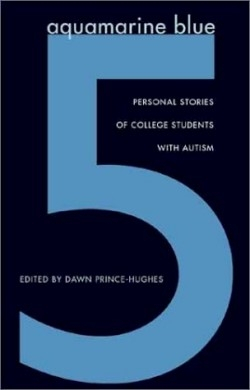Aquamarine Blue 5
Personal Stories of College Students with Autism
People with autism can excel in an academic setting. Often intensely focused and detail-oriented, students with autism have advanced several fields of research. People with autism often have difficulties in school due to special needs that are not recognized or met, despite the students’ academic ability. In this book, college students with autism share experiences of college life. Their challenges are diverse; their stories are engaging; and in many cases their writing is excellent.
The collection is edited by Dawn Prince-Hughes, herself a person with autism and professor of anthropology at Western Washington University. Prince-Hughes was able to apply insights from ape behavior to human relationships. Her unusual approach to understanding human behavior leads to powerfully clear analysis of the problems faced by people with autism.
Aquamarine is the color associated with the number five for one graduate student with autism. Synthesia, a form of cross-perception, enabled this woman with autism to see music and words in color. Seeing words in color helped her to memorize them, and she become a pioneering linguist. Food preferences are a major issue for some people with autism. In an essay that illuminates the risks associated with violating social conventions, one young woman explains how odd eating habits nearly ruined her college career. This woman could not stand to eat more than one type of food at a time. Sometimes she was physically sickened by the sight of people eating different types of foods together. She was considered anorexic by school counselors and nearly institutionalized but, luckily, her problems were solved when she was allowed to eat before the cafeteria opened to the general student population.
Other students describe difficulties adjusting to changing physical environments or interpreting social cues. Some are extremely sensitive to light or sound; some can only tolerate large cotton clothing; others need to bring unusual objects with them to class.
Prince-Hughes concludes the book with a list of simple, inexpensive approaches for universities interested in becoming more inclusive. She also provides web links and a bibliography for those seeking more detailed information. This is essential reading for school administrators and for people with autism and their families and friends.
Reviewed by
Eartha Melzer
Disclosure: This article is not an endorsement, but a review. The publisher of this book provided free copies of the book to have their book reviewed by a professional reviewer. No fee was paid by the publisher for this review. Foreword Reviews only recommends books that we love. Foreword Magazine, Inc. is disclosing this in accordance with the Federal Trade Commission’s 16 CFR, Part 255.

